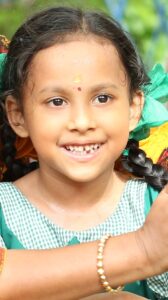Outpatients come for treatment
 Babies and small children come with their parents for physio-, occupational- and / or speech therapy. Some of them come daily or several times per week, others irregularly as they come from further away. We expect their parents to participate and cooperate to achieve the maximum result. This individual care is very time intensive and often several of our therapists are involved in the process. Unfortunately, parents often stop after some time, often when another baby is born and it becomes too hard for them to follow up on the treatment. Sometimes the expectations of parents are too high – for example they expect their child with a severe brain disorder to be able to walk and talk after a few therapy sessions, while in reality therapy is focused on reaching smaller goals. Many of the children who stopped coming, come back later – often when their parents realize that their child will not be able to follow mainstream schooling.
Babies and small children come with their parents for physio-, occupational- and / or speech therapy. Some of them come daily or several times per week, others irregularly as they come from further away. We expect their parents to participate and cooperate to achieve the maximum result. This individual care is very time intensive and often several of our therapists are involved in the process. Unfortunately, parents often stop after some time, often when another baby is born and it becomes too hard for them to follow up on the treatment. Sometimes the expectations of parents are too high – for example they expect their child with a severe brain disorder to be able to walk and talk after a few therapy sessions, while in reality therapy is focused on reaching smaller goals. Many of the children who stopped coming, come back later – often when their parents realize that their child will not be able to follow mainstream schooling.
Most of our children had a difficult start in life. Often there were complications during the pregnancy or the delivery. The earlier we begin, the better the result! We prefer to start with babies and small children as the greatest improvement can be achieved with early intervention.
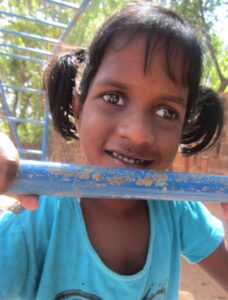 Sadhana was born in 2013 and was referred to us in 2015 when she was two and a half years old. Sadhana was delivered by caesarean section as she was overdue. She has a year older sister. Unfortunately, their father died of a malignant brain-tumour when Sadhana was just two months old. Her mother was very depressed having lost her husband and being left with two small girls to raise alone. Sadhana is a sweet girl who is very alert even though she is not able to talk or walk due to her low muscle tone. Her mother brings her for physio- and occupational- therapy twice a week. She has started moving on her own more and has started saying her first words.
Sadhana was born in 2013 and was referred to us in 2015 when she was two and a half years old. Sadhana was delivered by caesarean section as she was overdue. She has a year older sister. Unfortunately, their father died of a malignant brain-tumour when Sadhana was just two months old. Her mother was very depressed having lost her husband and being left with two small girls to raise alone. Sadhana is a sweet girl who is very alert even though she is not able to talk or walk due to her low muscle tone. Her mother brings her for physio- and occupational- therapy twice a week. She has started moving on her own more and has started saying her first words.
We also arranged a proper medical check-up. Due to her low-pigment skin lesions in her extremities she was diagnosed with Hypomelanosis, a syndrome which can come along with severe cognitive issues as well as abnormalities and malfunctioning of many organs, including the heart and kidneys. Further complications, such as epileptic seizures and brain tumours could also occur. We did not have the courage to explain all this in detail to Sadhana’s mother who is coming out of her depression, encouraged by Sadhana’s visible progress.
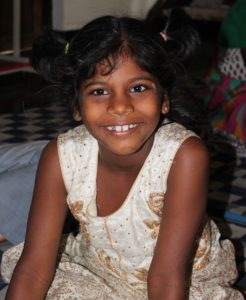 Yoga Lakshmi is a very active and smart girl who was born in 2011. She had no birth-cry and her mother had complications during pregnancy. Yoga Lakshmi was referred to us when she was three years old. We remember her as a wild little girl who hardly responded to anything. She was beating and biting, was easily distracted and did not look at us. Her hearing was tested and confirmed to be fine, though she still speaks only single words and puts everything in her mouth. It was important to show her parents how to insist on eye-contact and how to encourage Yoga Lakshmi at home rather than beating her. Quickly we found out that Yoga Lakshmi likes sounds and vibration. With a lot of patience and appropriate stimulation we built up a longer concentration span and Yoga Lakshmi now shows significant improvement and has improved interaction with her surroundings.
Yoga Lakshmi is a very active and smart girl who was born in 2011. She had no birth-cry and her mother had complications during pregnancy. Yoga Lakshmi was referred to us when she was three years old. We remember her as a wild little girl who hardly responded to anything. She was beating and biting, was easily distracted and did not look at us. Her hearing was tested and confirmed to be fine, though she still speaks only single words and puts everything in her mouth. It was important to show her parents how to insist on eye-contact and how to encourage Yoga Lakshmi at home rather than beating her. Quickly we found out that Yoga Lakshmi likes sounds and vibration. With a lot of patience and appropriate stimulation we built up a longer concentration span and Yoga Lakshmi now shows significant improvement and has improved interaction with her surroundings.
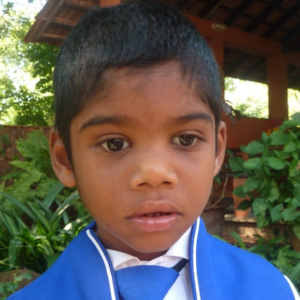 Gopinath was prematurely delivered by caesarean in 2011 and was kept in an incubator for 15 days. He has severe cognitive impairment due to brain injury which has also resulted in cortical blindness; a condition where his eyes function as normal, but visual information is not processed properly in his brain. It is not clear how much Gopinath can see and he is not able to tell us. He does not make eye contact and walks into objects and walls if not guided. Gopinath also has severe autism spectrum disorder. On top of everything else, Gopinath has also been having frequent epileptic seizures, despite taking the maximum dose of anti-epileptic drugs. His medication has recently changed which has seen a reduction in fits and we hope that will continue, as the constant epileptic attacks are damaging his brain and hindering his learning.
Gopinath was prematurely delivered by caesarean in 2011 and was kept in an incubator for 15 days. He has severe cognitive impairment due to brain injury which has also resulted in cortical blindness; a condition where his eyes function as normal, but visual information is not processed properly in his brain. It is not clear how much Gopinath can see and he is not able to tell us. He does not make eye contact and walks into objects and walls if not guided. Gopinath also has severe autism spectrum disorder. On top of everything else, Gopinath has also been having frequent epileptic seizures, despite taking the maximum dose of anti-epileptic drugs. His medication has recently changed which has seen a reduction in fits and we hope that will continue, as the constant epileptic attacks are damaging his brain and hindering his learning.
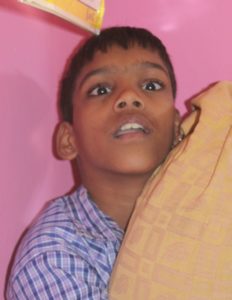 Shakti is the younger of twin-brothers born in 2007. His brother was fine however Shakti was only 1kg at birth, had no birth-cry and was therefore in the incubator for several days. Shakti has severe athetoid cerebral palsy which results in spasticity and trembling in most of his muscles. Although he is able to move his limbs, it is uncontrolled and a big effort for him. Even the muscles in the face are affected and he has difficulties eating and speaking, making his articulation unclear. Shakti is intelligent – he is attending a special school in town. His mother who is incredibly motivated insisted on bringing her boy to Deepam for physiotherapy treatment. We just could not say no to them. With regular exercise Shakti improved a lot and is now able to walk small distances with special shoes and the help of callipers and a walker. Once a week he also joins the Deepam children for swimming and the exercises in the water help him to relax his muscles. Shakti is an extremely motivated boy and has a very sweet nature.
Shakti is the younger of twin-brothers born in 2007. His brother was fine however Shakti was only 1kg at birth, had no birth-cry and was therefore in the incubator for several days. Shakti has severe athetoid cerebral palsy which results in spasticity and trembling in most of his muscles. Although he is able to move his limbs, it is uncontrolled and a big effort for him. Even the muscles in the face are affected and he has difficulties eating and speaking, making his articulation unclear. Shakti is intelligent – he is attending a special school in town. His mother who is incredibly motivated insisted on bringing her boy to Deepam for physiotherapy treatment. We just could not say no to them. With regular exercise Shakti improved a lot and is now able to walk small distances with special shoes and the help of callipers and a walker. Once a week he also joins the Deepam children for swimming and the exercises in the water help him to relax his muscles. Shakti is an extremely motivated boy and has a very sweet nature.
Kashmita was born in December 2011 and had a normal birth. She had some fine and gross motor developmental delay and was diagnosed with sensory motor polyneuropathy, a condition which reduces movement and sensation due to nerve damage. She has right hand and lower limb weakness and when she came to Deepam aged four she was not able to stand or walk without support. Kashmita received regular physiotherapy sessions at Deepam and is now able to stand and walk, albeit a little unsteady. In her first year at Deepam, Kashmita was uncooperative with therapy, however she loves singing, playing games and telling stories and when these are woven into her therapy, it becomes fun and motivating for her. She has made great progress and comes to Deepam for outreach physiotherapy, osteopathy and swimming pool-based physiotherapy. She is intelligent, cheerful and sociable and studies at Aikyam school. She has committed and supportive parents and we hope she will have a bright future.

